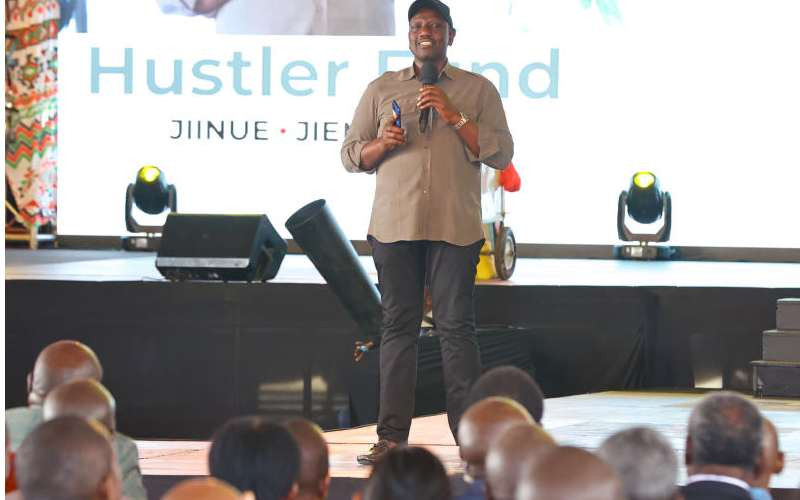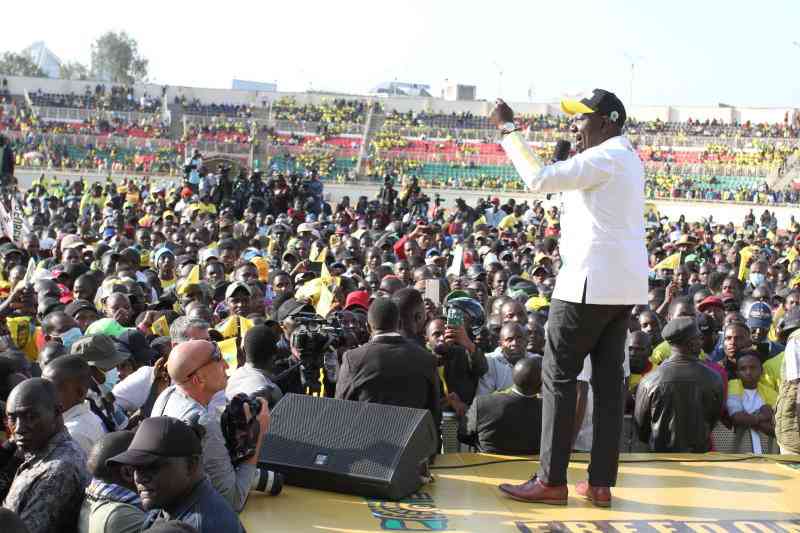
The origin of the name is somewhat disputed. Who came up with the 'hustler nation'? Political analyst Mutahi Ngunyi credits himself for coining the name for the constituency President William Ruto was targeting with his campaign message.But be it Ngunyi who came up with the name or Ruto, the United Democratic Alliance party leader took what is easily the biggest voting block and also one of the most disenfranchised in the country and turned it into a juggernaut that powered his election victory.You know them: The person who polishes and repairs your shoes, the vendor around the corner with a cart of sausages and eggs, the boda boda operator, the mama mboga, President Ruto appealed to them with a campaign message that put them at the centre.Ruto pushed wheelbarrows and made it known his humble beginnings as a chicken seller.If he from Kambi Kuku Market could make it to the presidency, then with leadership that understood their struggle, every hustler would. That was the unique selling point.
Wheelbarrow revolutionThe president's launchpad was the forum he held in his Karen residence, Nairobi, where he met youth business groups gifting them tools of their trade from hand carts, shaving machines, power washers and wheelbarrows.The wheelbarrow then became a symbol of a revolution against economic exclusion and was hoisted high in his rallies, like a crucifix would at a Christian rally. The wheelbarrow now adorns Ruto's, Presidential Standard.
He would rebuild the country's economy starting with those that languish at the bottom as the foundation, he said, and for that and several other messages targeted at the youth and the economically disenfranchised Ruto was elected.Yet the beginnings of the hustler nation came as early as 2016 when Ruto, then Deputy President, started to move out of Uhuru Kenyatta's shadow and sow the seeds of his presidential run to come in 2022.
'Dynasities'In the office, Ruto has made it clear that he did not intend to leave the people who voted for him behind.One of the highlights of Ruto's first 100 days in office was the launch of the Hustler Fund, albeit amid criticism that the fund he had sold as a grant for small businesses has been remodelled as a loan.The president also made true his promise to end the blacklisting of loan defaulters and to replace the dreaded Credit Reference Bureau (CRB) with a credit scoring system.All those blacklisted, disproportionately the youth, will be delisted and some loans have been written off.The hustler nation caught on as the socio-political and economic interests that came about as resistance to the Building Bridges Initiative (BBI) by Uhuru and ODM leader Raila Odinga.BBI was the hustler's antithesis, Ruto said, whipping the youth to his cause. It would entrench the power and money of the rich and alienate and marginalise the youth further, went his argument.Against the 'dynasties,' Ruto's hustler movement grew from strength to strength, fielding younger candidates such as in the Kiambaa by-election and scoring decisive victories.From there, Ruto won decisively in Central Kenya and went on to become president.

Yet the start has not been so smooth. The makeup of his Cabinet whose declared net worth was in the eye-watering billions raised eyebrows.Further, Ruto's flagship fund for the hustlers has been criticised as being insignificant to count as providing capital for any business.As of December 30, Sh12 billion had been disbursed according to data from the government. Some Sh4.7 billion has been repaid."But these are small loans and Cooperatives and MSME Cabinet Secretary Simon Chelugui announced that President Ruto would launch another product of Hustler Fund in February that will allow businesses to borrow amounts ranging from Sh100,000 to Sh2.5 million," he said.
MasterstrokeCriticism against the president's marshalling of the youth as a probable cause of a class war did not stick. It was simply waved away as the panic of the rich aware that the poor were now demanding their worth.
Yet with his masterstroke, Ruto made the economy and what the youth would get out of it the dominant frame of the campaign. Economic inclusion became the buzzword.But as the President settles down to serve amid the pressure of the rise in the price of basic commodities due to the removal of subsidies and global factors, one of his immediate concerns is how he will keep the hustlers in his corner.There is a worry of aggressive taxation also targeting small businesses as the government looks for a solution to raise revenue away from external borrowing.Ruto has already kicked off an ambitious affordable housing plan that he hopes will provide employment opportunities for the artisans that will provide items such as doors and windows and other fittings for the units. The housing plan will also employ some of the millions of unemployed youth.Sam Omwenga, a legal Analyst and political commentator, opines that the Hustler Nation narrative reinvented Ruto to counter the handshake between Uhuru and Raila."When it comes to effective messaging - be it in politics or business marketing - all you need is a simple message that resonates with the masses to buy your product or whatever you are selling," he says.
 The Standard Group Plc is a multi-media organization with investments in media platforms spanning newspaper print
operations, television, radio broadcasting, digital and online services. The Standard Group is recognized as a
leading multi-media house in Kenya with a key influence in matters of national and international interest.
The Standard Group Plc is a multi-media organization with investments in media platforms spanning newspaper print
operations, television, radio broadcasting, digital and online services. The Standard Group is recognized as a
leading multi-media house in Kenya with a key influence in matters of national and international interest.

